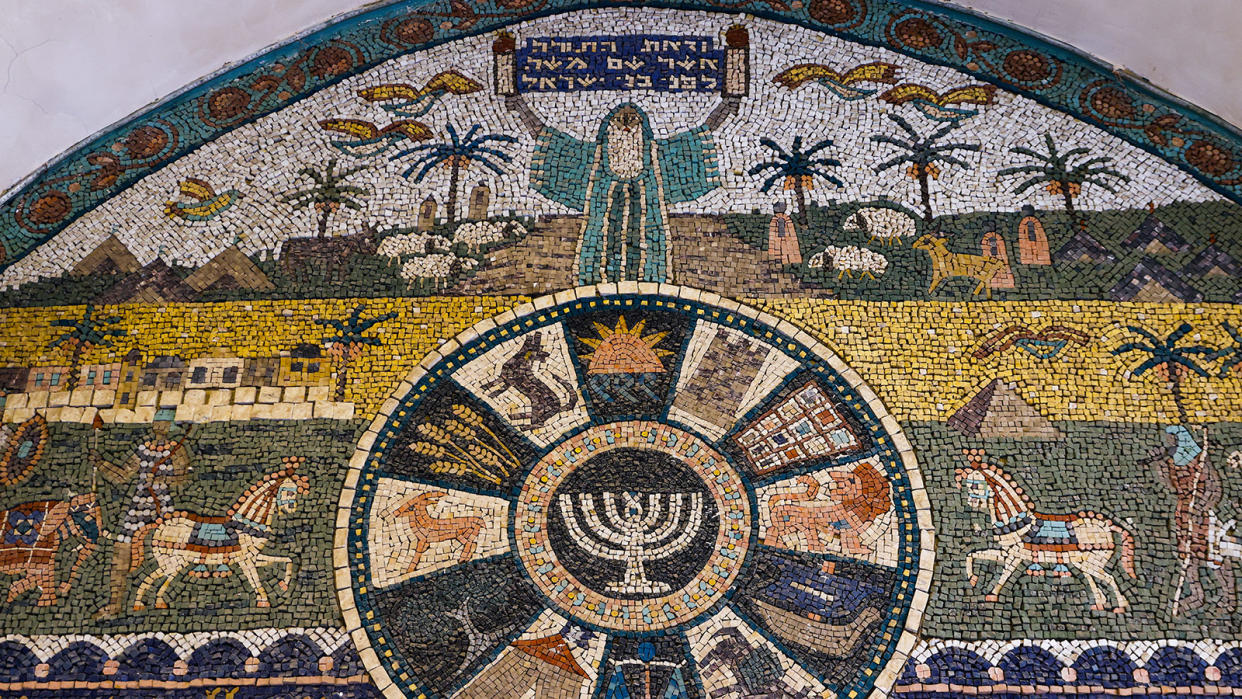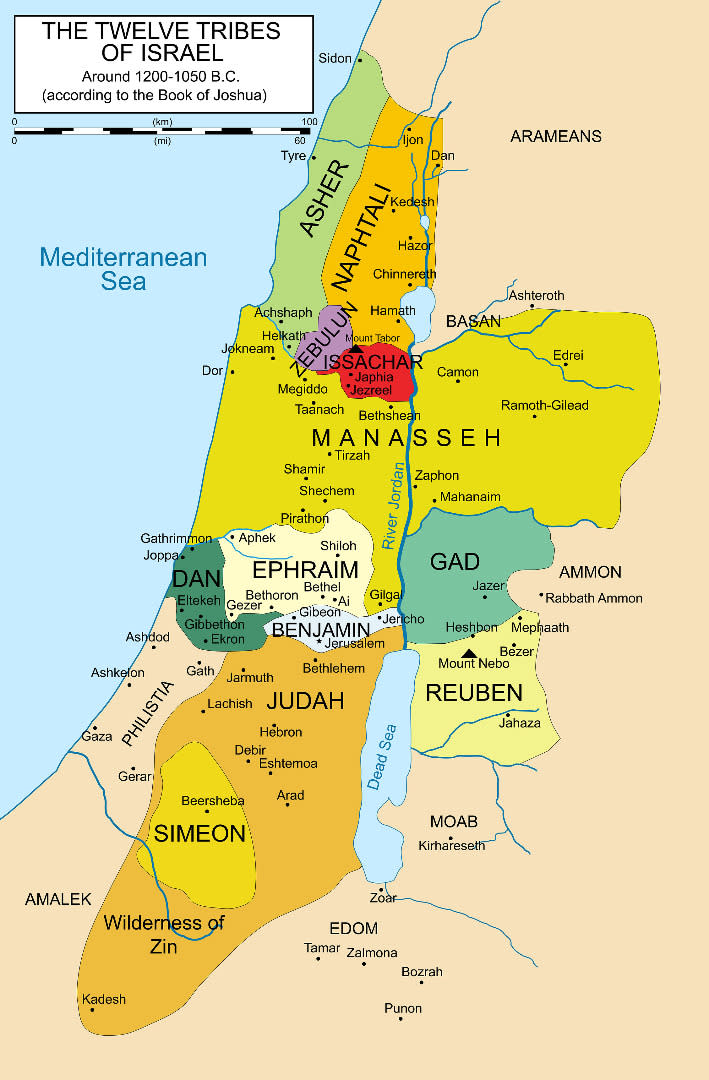Who Were the 12 Tribes of Israel and Did They Exist?

The existence of the 12 tribes of Israel is central to the narrative of the Hebrew Bible (known to Christians as the Old Testament). The tribes were named after the 12 sons of the patriarch Jacob and believed to be their direct descendants. As God's people escaped slavery in Egypt, wandered the desert for 40 years and eventually conquered and settled the "promised land" of Canaan, they did it all as members of these 12 named tribes.
Scholars long assumed that the biblical accounts of the 12 tribes of Israel were based on ancient historical events transmitted through oral history. After all, the Hebrew Bible repeatedly places the tribes front and center in its account of Israelite and Jewish history. Tribal distinctions must have been a huge part of the ethnic and religious identity of these ancient peoples.
But over the past few decades, as more historians and archeologists openly question the historical accuracy of the Bible, a new picture of the 12 tribes of Israel has emerged.
"While it's likely that there were some tribes in early Israel, I don't know if there were 12, and it's hard to say what role they actually played," says Andrew Tobolowsky, a religious studies professor at the College of William & Mary. "There were certainly times when tribal affiliations were important, but probably not nearly as important as the Bible makes them out to be."
The Birth (Literally) of the 12 Tribes
The 12 tribes of Israel are introduced in the book of Genesis, home to all of the famous origin stories from the Hebrew Bible (the Creation, Adam and Eve, Noah's Ark, etc.). One of those stories concerns Jacob, the son of Isaac and grandson of Abraham. Jacob marries two sisters, Leah and Rachel, and sires children with both women (as well as with two of their servants, Zilpah and Bilhah).
According to Genesis, here are the names of Jacob's sons from oldest to youngest:
Reuben (with Leah)
Simeon (with Leah)
Levi (with Leah)
Judah (with Leah)
Dan (with Bilhah, Rachel's maid)
Naphtali (with Bilhah, Rachel's maid)
Gad (with Zilpah, Leah's maid)
Asher (with Zilpah, Leah's maid)
Issachar (with Leah)
Zebulun (with Leah)
Joseph (with Rachel)
Benjamin (with Rachel)
In Genesis 32, Jacob wrestles with God (or an angel) and is blessed with a new name: Israel (meaning "he struggles with God"). From that time forward, the sons of Jacob become the "sons of Israel," and all of Jacob's posterity become known as the "children of Israel" or "Israelites."
But when are the sons of Israel (Jacob) first called the 12 tribes of Israel? In Genesis 49, Jacob has grown old and is about to die, so he gathers all of his sons to give them individual blessings. While Jacob only explicitly blesses Dan to become a "tribe of Israel," after all the blessings are pronounced, the text says, "All these are the twelve tribes of Israel."
To confuse matters, Tobolowsky says there are more than 20 tribal lists in the Hebrew Bible and not all of them are the same. In some, for example, two tribes named after Joseph's sons, Ephraim and Manasseh, replace the tribe of Joseph (yes, replacing one tribe with others named for the two sons makes 13 tribes). One explanation in the book of Numbers is that God only allotted land in Canaan to 12 of the 13 tribes. The tribe of Levi was set apart as the priestly tribe, and instead of receiving land they received offerings from the other tribes.
In the biblical narrative, the 12 sons and their families have to leave Canaan and settle in Egypt to avoid a famine. Over a 400-year period, the Egyptians enslave them, but eventually, a man named Moses leads their descendants back to Canaan after they fight many battles. The area that was Canaan encompasses the modern state of Israel, the West Bank and Gaza, Jordan, and the southern portions of Syria and Lebanon, according to the University of Pennsylvania Museum.
If you continue to follow the chronology of the Hebrew Bible, the identity of the 12 tribes of Israel isn't stable. Some tribes are shuffled around by internal political divides and others are "lost" to outside invasions.

Northern Kingdom vs. Southern Kingdom
Under King David, the Bible tells us, all 12 tribes of Israel were under one kingdom as the "united monarchy." That unification continued under King Solomon, whose wealth and power the Bible describes as unmatched in the ancient world.
But after Solomon's death, there was a violent split between the northern kingdom of Israel and the southern kingdom of Judah. Here's how the tribes were divided geographically and politically under those two kingdoms:
Israel (Northern Tribes)
Reuben
Dan
Naphtali
Gad
Asher
Issachar
Zebulun
Ephraim
Menasseh
Judah (Southern Tribes)
Judah
Simeon
Benjamin
(Possibly Levi because of the Jerusalem temple)
In 722 B.C.E., the Assyrians invaded the northern kingdom of Israel for failing to pay tribute. According to the Bible, all the tribes in the northern kingdom were taken away into bondage, and their lands were occupied by foreigners. This is the origin of the "lost tribes of Israel," who were scattered in places like Assyria and Media (now parts of Turkey, Syria, Iraq and Iran) and who lost their tribal and religious identities over time through assimilation (or who maintained their Jewish identity in secret).
In 586 B.C.E., the southern kingdom of Judah was invaded by the Babylonians, who sacked Solomon's magnificent temple in Jerusalem and carried off the remaining tribes into exile. When the Persians defeated the Babylonians and allowed the people to come back and rebuild the temple, they were simply known as the people of Judah (or Judahites), which is where we get our word Judaism.
Who Wrote the Hebrew Bible?
If you're a casual reader of the Bible, you might assume that it was written in chronological order. Meaning, Genesis was written first, then Exodus, Leviticus, etc., all the way through the Hebrew Bible and the New Testament.
But when biblical scholars read the texts closely, they find convincing evidence — in the grammar, word choices and internal contradictions — that the books of the Bible were not only written out of order, but by different authors with their own religious and political agendas.
When it comes to the Pentateuch (the first five books of the Hebrew Bible, known as the Torah is Judaism), the traditional theory is that there were four authors: the Elohist (who calls God Elohim), the Yahwist (who calls God Yahweh), the Priestly author (from Jerusalem in Judah, also known as the Judahite) and the Deuteronomist (who wrote Deuteronomy). But those four authors didn't share writing duties equally.
"It was the Judahites who wrote most of the Pentateuch and were responsible for putting it together," says Tobolowsky. "The Priestly author is usually imagined as the last and most important author, and there are a number of reasons we think he, or more likely they, were Judahites, including a lot of rules for religious practices that are later described as occurring only at the Jerusalem temple."
Tobolowsky argues that the whole concept of the "tribes of Israel" (whether 12 or more or fewer) also originated in the stronger northern kingdom of Israel and was adopted much later by the Judahites and the Priestly author.
One of his key pieces of evidence is the so-called "Song of Deborah" in Judges 5. Because of its ancient form of Hebrew, scholars think that the "Song of Deborah" is one of the oldest texts in the Hebrew Bible, dating back to the 12th century B.C.E. In the text, the prophetess Deborah recounts a historic battle and names the tribes of Israel who participated. Notably absent from this earliest tribal list are Judah and Simeon, the chief tribes of the kingdom of Judah.
For Tobolowsky, this ancient text is a clue that "in the early period, the people of Judah wouldn't have necessarily thought of themselves as Israelites." Tobolowsky has found supporting evidence in other tribal lists (like "Moses's Blessing" in Deuteronomy 33) where he believes the Priestly author later added references to Judah and Simeon.
Why Did the Judahites Adopt the 12 Tribes?
By the time the Priestly authors were writing and compiling books like Genesis and Exodus, the Assyrians had already destroyed the powerful northern kingdom and the Babylonians had taken the southern kingdom captive. The Priestly author would have been highly motivated to write a history of the "children of Israel" in which Judah was central to the story of the 12 tribes of Israel from the very beginning.
"The invention of a '12 tribes' tradition that also included Judah and its tribes was probably part of Judah's later efforts to define itself as Israel," says Tobolowsky, who wrote all about this identity shift in his book "The Myth of the Twelve Tribes of Israel: New Identities Across Time and Space." "What we have in the Bible is certainly an elaboration on earlier traditions. The question is, how much did the authors of the Bible elaborate?"
Tobolowsky goes as far as theorizing that the Judahites and their Priestly author "invented the basic concept of Jacob as the ancestor of all the tribes" as a way of creating a "Panisraelite" identity that not only included Judah, but gave it a place of prominence.
Now That's Cool
Many groups have claimed to be descendants of the "lost tribes" of Israel — the Igbo in Nigeria and the Bnei Menashe of Northern India — but the State of Israel only recognizes Ethiopian Jews, known as Beta Israel, as "lost" members of the tribe of Dan.
Original article: Who Were the 12 Tribes of Israel and Did They Exist?
Copyright © 2024 HowStuffWorks, a division of InfoSpace Holdings, LLC, a System1 Company


